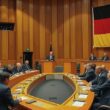The Alternative for Germany (AfD) has experienced a slight retreat in recent polling data, signaling a potential stabilization after a period of unprecedented gains. The latest “Trendbarometer” survey, conducted by Forsa for RTL and ntv, places the AfD at 26 percent, a one-point decrease from its recently achieved record high. While still maintaining a lead over the Christian Democratic Union (CDU) at 24 percent, the slight dip introduces a layer of complexity to the ongoing political landscape.
This marginal shift coincides with a one-point increase for the Left party, now standing at 12 percent. The Green party remains stable at the same value. The Social Democratic Party (SPD) continues to hover at 13 percent, while the recently formed BSW maintains 4 percent, the FDP clings to 3 percent and the “Others” category accounts for 6 percent. These stagnant results across most parties underscore a broader sense of political inertia within the established order.
Adding to the CDU’s difficulties, leader Friedrich Merz continues to face a decline in public approval. His approval rating has plummeted to a concerning 26 percent, marking a new low point during his tenure. This decline potentially reflects anxieties surrounding the CDU’s strategy and its ability to offer compelling solutions to pressing economic and social challenges. The party faces increasing pressure to clarify its direction and reconnect with voters disillusioned by the current political climate.
Public sentiment regarding the German economy remains overwhelmingly negative. A staggering 64 percent of respondents anticipate a deterioration in economic conditions, the poorest result since the turbulent years of the “traffic light” coalition government. Only 16 percent express optimism about future economic growth, while 19 percent predict no change. This pervasive pessimism highlights a deep-seated unease about the nation’s financial trajectory and contributes to voter volatility.
The ongoing conflict in Ukraine remains the dominant concern for German citizens (48 percent), followed closely by the performance of the federal government (34 percent) and the escalating tensions in the Middle East (31 percent). These anxieties demonstrate the interconnectedness of global events and their profound impact on domestic political discourse. The survey, conducted between September 20th and 26th, 2025, based on a sample size of 2,001 respondents, offers a snapshot of a nation grappling with geopolitical instability and economic uncertainty, creating a fertile ground for political realignment.





